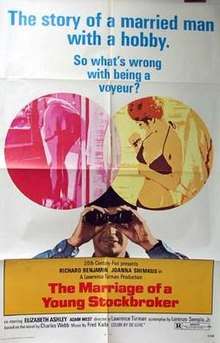The Marriage of a Young Stockbroker
The Marriage of a Young Stockbroker is a 1971 American romantic comedy-drama film released in 1971, based on a novel of the same title by Charles Webb. It was directed and produced by Lawrence Turman, whose credits most notably include producing 1967's high-grossing hit The Graduate, which also was adapted from a book by Webb.
| The Marriage of a Young Stockbroker | |
|---|---|
 Theatrical release poster | |
| Directed by | Lawrence Turman |
| Produced by | Lawrence Turman |
| Written by | Lorenzo Semple Jr Charles Webb |
| Starring | Richard Benjamin Joanna Shimkus Elizabeth Ashley Adam West Patricia Barry |
| Music by | Fred Karlin |
| Cinematography | László Kovács |
| Edited by | Fredric Steinkamp |
| Distributed by | 20th Century Fox |
Release date |
|
Running time | 95 minutes |
| Country | United States |
| Language | English |
| Budget | $2,230,000[1] or $1.5 million[2] |
It stars Richard Benjamin in the title role and Joanna Shimkus as his beleaguered wife, with Adam West, Elizabeth Ashley, Patricia Barry, and Tiffany Bolling in supporting roles.
Synopsis
The story mainly deals with the crumbling marriage of William Alren (Richard Benjamin) and his wife Lisa (Joanna Shimkus), and how William uses voyeurism and extra-marital affairs to "spice up" his marriage. William gives up his career as a stockbroker, and takes up voyeurism full-time.
After putting up with her husband's various dalliances, Lisa is advised by her outspoken sister Nan (Elizabeth Ashley) to get a divorce. Nan's own marriage to Chester (Adam West) is in no better shape than Lisa's and equally on the rocks. The film ends with William and Lisa reunited, but not before Lisa finally gets "revenge" on her husband.
Cast
- Richard Benjamin as William Alren
- Joanna Shimkus as Lisa
- Adam West as Chester
- Elizabeth Ashley as Nan
- Patricia Barry
- Tiffany Bolling
Critical reception
Critic Leonard Maltin felt that while the film was a "humorous and sad depiction of marital breakdown", the cast was let down by a script that "seems uncertain as to what point it wants to drive across" (Maltin, 1991: 769). Steven Scheuer concurred somewhat, saying that while the film was "occasionally amusing" it also tended to be "generally heavy-handed" (Scheuer, 1990: 672).
Roger Greenspun generally found the picture to be miscast, especially Richard Benjamin, feeling that while he is "a good comedian [he is] miscast [in this role]" (Greenspun, 1971). He also thought it closer to an "unsuccessful television pilot" than a movie, in terms of its treatment of themes such as "sexual mechanics, the mechanics of marital supremacy, [and] the nuclear family as a machine for getting on in the suburbs" (Greenspun, 1971). Leslie Halliwell called it a "sardonic adult comedy of the battle of the sexes" (Halliwell, 2000: 522).
See also
References
- Greenspun, Roger (1971) "The Marriage of a Young Stockbroker" The New York Times, August 20, 1971. (accessed 6 April 2008).
- Halliwell, Leslie (2000) Walker, John (ed.) Halliwell's Film & Video Guide 2001, HarperCollinsEntertainment, London.
- Maltin, Leonard (1991) Leonard Maltin's Movie and Video Guide 1992, Signet, New York.
- Scheuer, Steven H. (1990) Movies on TV and Videocassette, Bamtam Books, New York.
Notes
- Solomon, Aubrey. Twentieth Century Fox: A Corporate and Financial History (The Scarecrow Filmmakers Series). Lanham, Maryland: Scarecrow Press, 1989. ISBN 978-0-8108-4244-1. p256
- ALJEAN HARMETZ (Jan 24, 1971). "But They Still Say 'Larry Who?': They Say 'Larry Who?'". New York Times. p. D13.